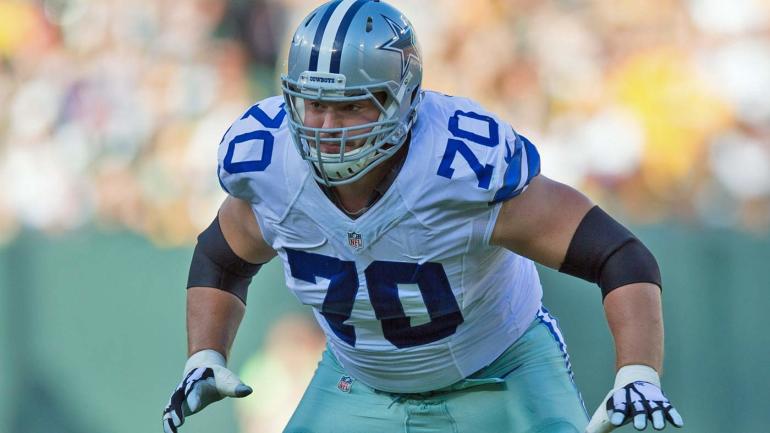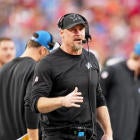
Offensive guard Zack Martin didn't report to Cowboys training camp on July 25 because he is unhappy with his contract. The eight-time All-Pro (two second-team selections) feels he is "woefully underpaid relative to the market," according to ESPN.
Martin signed a six-year, $84 million contract extension, averaging $14 million per year, in 2018 that made him the NFL's highest-paid offensive guard. The deal also put Martin second in the offensive lineman salary hierarchy when signed behind only the $16 million-per-year deal Nate Solder received from the Giants in 2018.
Martin's contract runs through the 2024 season. The 32-year-old is scheduled to make $13.5 million this year with $11.8 million converted to signing bonus during a contract restructure in March that created $8.85 million of 2023 salary cap space. Martin's 2024 compensation is $14 million.
Martin's source of unhappiness
Things have changed with offensive guard pay since Martin got his extension in June 2018. Martin, who was named to the NFL's 2010s All-Decade Team, is now the league's eighth highest-paid offensive guard by average yearly salary.
The biggest changes have come in the last year. Quenton Nelson dramatically reset the market right before the start of last season when the Colts made him the league's first $20 million-per-year interior offensive lineman. His four-year, $80 million extension, averaging 20 million per year, was 21.21% more than the market-topping $16.5 million-per-year deal Brandon Scherff signed with the Jaguars in 2022 as an unrestricted free agent.
Chris Lindstrom is now the league's highest-paid offensive guard. He received a five-year, $102.5 million extension from the Falcons in March, averaging $20.5 million per year. Lindstrom also established new offensive guard benchmarks for guarantees with $62.702 million in total guarantees and $48.202 million fully guaranteed at signing.
Jerry Jones' hardline stance
Cowboys owner Jerry Jones hasn't minced words regarding Martin's situation. "It's not about precedent. It's about facts," Jones said Saturday. "We need the money to pay (Micah) Parsons. We need the money to pay the players that we got to pay in the future. It's a fact. It's not even a philosophy. It's just a fact."
The precedent Jones was likely referring to is Ezekiel Elliott's 39-day holdout in 2019. Jones caved to Elliott's contract demands by making him the league's highest-paid running back with a six-year, $90 million extension, averaging $15 million per year, when he had two years remaining on his rookie contract.
Unlike with Elliott, Jones has been adamant about not addressing Martin's contract. "He'll come to camp when he comes to camp," Jones said. "There's no resolution. There are a lot of consequences if he doesn't. … He's been at the top of the money all the way through, drafted high and got a lot of money, got a lot of money over the years. It's just hard to get it all. The bottom line is, nothing needs to happen."
Financial consequences of Martin's holdout
Martin is being fined $50,000 for each day of training camp he misses. As a player on a veteran contract, the daily fine is mandatory and can't be reduced or waived.
The financial consequences Jones referenced run much deeper than the daily fine. A team can also recover a portion of a player's signing bonus.
Fifteen percent of the prorated amount of signing bonus can be recouped on the sixth day of a training camp holdout. It's 1% for each additional missed day with a maximum of 25% of the prorated amount during training camp. An additional 25% can be recovered with the first missed regular-season game. After four missed weeks in the regular season, a team can recover 1/18th of the prorated amount for each additional week of the player's absence. The maximum a team can recover in a season is the entire prorated amount of the player's signing bonus in that contract year.
None of the $20 million signing bonus Martin got in his 2018 extension can be recouped. The proration was from 2018 through 2022.
Martin has restructured his contract on four different occasions in 2020, 2021, 2022 and 2023 where he converted a total of $41.4 million that was base salary into signing bonus to create cap room for the Cowboys. The combined $9.34 million of 2023 signing bonus proration from the four restructures is potentially at risk.
Ordinarily around the NFL, recovery of signing bonus is limited to that particular year when a simple contract restructure, like Martin has repeatedly done, occurs. This is because a team wouldn't have any recovery rights if the money had remained as base salary. The NFL Collective Bargaining Agreement prevents teams from recovering base salary after it has been paid.
Cowboys contracts have broad language where recoupment rights continue until the proration runs out as was the case with Martin's $20 million signing bonus. The lone exception is Dak Prescott's contract that has been restructured three times since he signed in 2021. Dallas doesn't have the ability to get back any of the money Prescott turned into signing bonus for cap purposes beyond the year the salary conversion takes place.
Martin could be out $2.335 million in addition to the daily $50,000 fine if his holdout continues until Aug. 9 -- $2.335 million is the maximum 25% that can be recovered from his combined 2023 signing bonus proration in a holdout that doesn't extend into the regular season. Recoupment of signing bonus in a training camp holdout is at a team's discretion.
Martin's $500,000 offseason workout program base salary de-escalator has also been triggered with his holdout. He needed to complete 84.375% of the scheduled workouts as well as timely report to and fully participate in the mandatory minicamp and training camp. Martin's 2023 base salary is dropping from $1.7 million to $1.2 million. This is a standard clause in Cowboys veteran contracts.
How Cowboys could address Martin's contract
The Bengals have provided Jones with a roadmap to handle Martin's contract should he back off his hardline stance. Trey Hendrickson was just given a one-year extension worth $21 million although he had two years remaining on the four-year, $60 million deal he signed in 2021 because he had outperformed his contract.
The Pro Bowl edge rusher gets a $5 million raise or 23.81% of the new $21 million in new money this year. Hendrickson is making $18 million instead of $13 million. His 2024 compensation remains $15 million while he makes $16 million in 2025, the year that was added to his contract.
A one-year extension worth $21 million to $22 million would seem appropriate with Jones going this route. When Martin signed in 2018, his $14 million per year eclipsed Andrew Norwell's $13.3 million per year, which was the offensive guard standard at the time, by 5.26%. Doing the same thing would put Martin's one-year extension at $21.5 million.
Martin could be given a $5 million signing bonus that would be prorated at $1.25 million annually through 2026 because Dallas added voiding/dummy 2025 and 2026 contract years in the 2022 restructure. His $14 million of 2024 compensation should be guaranteed in the process.
The 2025 season would be converted into a real contract year where Martin makes an unsecured $16.5 million. The $16.5 million could be broken into an $11.5 million 2025 base salary and a $5 million fifth day of the 2025 league year roster bonus (mid-March 2025) while 2026 would continue to be a voiding/dummy year.
Another option would be to add incentives and a 2024 base salary escalator to Martin's contract. Over the last couple of years, some teams have added incentives to contracts as a way to placate players who felt underpaid. For example, the Dolphins added $3.5 million of incentives to Xavien Howard's 2021 contract year because the cornerback market had changed in the two years since he signed a five-year extension at the top of the market in 2019.
This year, the Chargers added $1.75 million to running back Austin Ekeler's contract. It was a compromise that Ekeler found acceptable after the Chargers refused to extend his contract. This season is Ekeler's contract year. He'll be an unrestricted free agent in the offseason.
Incentives will be more challenging with Martin. It's harder to statistically quantify what offensive linemen do than offensive players at other positions.
Incentives are usually designed to be classified as not likely to be earned (NLTBE) so that they will not count against the salary cap when a deal is signed. Generally, any incentives with higher thresholds than the player or team's statistical performance in the prior season qualify as NLTBE.
The most frequent categories for individual achievement are playtime or based on the player's primary function (i.e.; rushing yards for a running back). Coupling an individual achievement with a team statistical performance also makes an incentive NLTBE. If earned, a team will incur a salary cap charge for most incentives after the playoffs end. Incentives are typically paid in February or March following the season in which they are earned.
Martin was on the field for 98.36% of Dallas' offensive snaps last season, which is an extremely high threshold to exceed. Lowering the playtime requirement to 90% would be considered likely to be earned (LTBE) where there would be a 2023 cap charge because Martin hit the mark in 2022. Honors incentives would also be LTBE since Martin made the Pro Bowl and was first team All-Pro in 2022.
Team success where the Cowboys went to the NFC Championship Game or beyond would be NLTBE. Dallas was eliminated in the divisional playoff round last season. There is usually some kind of playtime component associated with team success incentives even when it isn't necessary to be NLTBE. For example, Prescott has a $1 million incentive annually for the Cowboys winning the Super Bowl where he must also take at least 50% of Dallas' offensive snaps in the game in order to collect.
With $20.8 million of 2023 cap space, according to NFLPA data, the Cowboys are in a position to accommodate some LTBE incentives for Martin. There would be a cap credit following the season if anything considered LTBE wasn't earned.
There could be a total of $3 million of incentives each year (2023 and 2024), which were a combination of individual and team achievements. One way to do it would be to add $500,000 each for Pro Bowl and first team All-Pro and 90% offensive playtime. There would be a $1.5 million 2023 cap charge because Martin achieved these things in 2022.
The other $1.5 million would be NLTBE. There could be $500,000 for 90% playtime and the Cowboys improving from last season in an offensive category, such as total offense, average yards per rushing play, average yards per passing play or completion percentage. The Cowboys getting to the NFC Championship Game and Super Bowl would also be worth $500,000 apiece provided Martin had at least 50% offensive playtime in that respective game.
The amount of incentives earned in 2023 would also get added to Martin's 2024 base salary. He would be able to make a maximum of $9 million from his performance bonuses.
Contract unhappiness has also been addressed by teams increasing a player's current year salary while reducing the compensation in the future by a corresponding amount. The Titans did this with All-Pro Bowl running back Derrick Henry last year. Because Henry got a $2 million raise last season, he's making $10.5 million this year instead of the $12.5 million that was originally in his 2023 contract year.
Five million of Martin's 2024 compensation could be turned into signing bonus so he would be making $9 million instead of $14 million. Martin's 2023 cap number would increase by $1,666,666. His 2024 cap number would decrease by $3,333,334 to $20,006,666.
Final thoughts
Jones apparently thinks he can wait Martin out because the severe financial penalties should deter a lengthy absence. Dallas' ability to recoup money that wouldn't be possible with most other teams is problematic for Martin.
Quite frankly, Martin doesn't have any leverage. It wouldn't be a surprise for Martin to eventually demand a trade if Jones continues to be unwilling to make any adjustments to his contract.





















